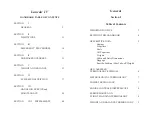
5
TECHNICAL DESCRIPTION
Construction of the canopy:
The canopy of the MUSE 4 consists of 46 cells over the wingspan. The wingtips are
slightly pulled down and this produces a kind of stabilizer. The Muse 4 is combination of
two and three rib diagonal-construction paraglider. Every main rib is attached to the 4
suspension lines. Between these main suspension ribs, intermediate ribs are
suspended by “bridge” diagonal ribs system. These diagonal ribs lead to 80% of height
of ribs. This construction ensures a smooth top surface and precise airfoil reproduction.
The internal reinforcements maintain the precise form of the canopy and provide
stability. The cell openings on the under-surface of the profile’s nose provide airflow into
the glider. Stretch resistant flares, integrated with diagonal ribs at the suspension points,
ensure an even distribution of load throughout the canopy. A stretch resistant Mylar-
reinforcements combined with plastic rods on the leading edge help to keep airfoils in
right shape and this guarantees a high level of stability. Large cross spots allow
effective airflow inside the canopy, providing good re-inflation without reducing the
profile accuracy. The Muse 4 is made of the proven Nylon fabrics Porcher Sport Skytex
Rip-stop 9017 E25A and 9017 E29A. Like any synthetic material, this can deteriorate
through excessive exposure to UV.
Rigging system:
The lines of the Muse 4 are made of proven strong and stretch resistant covered
Aramid/Kevlar lines. The entire rigging system comprises individual suspension lines
looped and stitched at each end. The sheathed Aramid/Kevlar lines have strengths from
60 kg up to 240 kg.
The suspension lines are comprised of “cascaded top lines” (attached to the under-
surface),”cascaded middle lines” (cascade 2 to 2 top lines together on middle main
lines), and “main lines”. Main lines lead to the “quick link” (a Maillon which connects
lines and risers). The “stabilizer lines” connect the upper stabilizer lines on the outer
suspension points with the quick link. The „brake lines” are not load carrying suspension
lines. They lead from the trailing edge of the canopy to the main brake lines and run
through the pulleys on the C-risers to the brake handles.






































